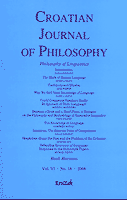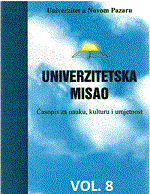
Our Take: No Chaffing Matter
The shortsighted protectionism of Central Asia’s only major grain exporter is the latest body blow to the region’s unsteady economies.
More...We kindly inform you that, as long as the subject affiliation of our 300.000+ articles is in progress, you might get unsufficient or no results on your third level or second level search. In this case, please broaden your search criteria.

The shortsighted protectionism of Central Asia’s only major grain exporter is the latest body blow to the region’s unsteady economies.
More...
While inflation runs away with the economy, Yushchenko and Tymoshenko pursue a clownish rivalry.
More...
Slovakia will soon cap a successful decade by adopting the euro. But what’s the rush?
More...
An interreligious choir reminds Bosnians that the country’s differences need not preclude unity.
More...
An omnipresent figure in Georgian politics won’t be on the ballot. But Nino Burjanadze doesn’t sound like a quitter.
More...
The paper reconstructs Plantinga’s understanding of knowledge as an alternative to the standard conception of knowledge. In the first phase, Plantinga’s work about warrant was taken as a contribution to the discussion about the possibility of a priori knowledge. With his conception of knowledge as warranted belief he wanted to show that also a posteriori belief can have a degree of warrant, and may be considered to be knowledge. The paper concludes that Plantinga points at an alternative to the standard conception of knowledge, but cannot show either that God exists or that the theistic belief is universally basic without lapsing again into one of those self-referential theories that he would in principle reject.
More...
We here propose an account of what it is for an agent to be objectively justified in holding some belief. We present in outline this approach, which we call transglobal reliabilism, and we discuss how it is motivated by various thought experiments. While transglobal reliabilism is an externalist epistemology, we think that it accommodates traditional internalist concerns and objections in a uniquely natural and respectful way.
More...
In his influential Naming and Necessity lectures, Saul Kripke made new sense of modal statements: “Kant might have been a bachelor”, “Königsberg is necessarily identical with Kaliningrad”. Many took the notions he introduced—metaphysical necessity and rigid designation—to herald new metaphysical issues and have important consequences. In fact, the Kripkean insight is at bottom semantic, rather than metaphysical: it is part of how proper names work that they purport to refer to individuals to whom modal properties can be ascribed. We can see this by reflecting on analytic truths that ground modal claims like the two examples above.
More...
An argument for skepticism about the past exploits a circularity in the arguments connecting present observations to claims about past events. Arguments supporting claims about the past depend on current observations together with processes linking current observations to those claims. But knowledge of processes requires knowledge of the past: Knowledge of the present alone cannot provide evidence for claims about the past. A practical, coherentist response to this challenge rejects the assumption that we come to the problem with no information about the past. Beginning with partial and imperfect information about the past, a coherentist tests ideas about processes against the particular evidence of traces left by past processes, and particular claims about the past against ideas about the processes linking those events to present traces. However, this common-sense response is inadequate when faced with a radical skeptic prepared to insist on the problem of the criterion. An answer to this radical skeptic can be drawn from Wilfrid Sellars ‘bootstrap’ argument in “Empiricism and the Philosophy of Mind.” The result is a better response to the problem of the criterion than Chisholm’s ‘particularism’.
More...
Access internalism about epistemic justification is the thesis that a person’s justification for a belief is directly accessible to that person, in the sense that the person can have direct awareness of whatever is functioning as the actual justification for the belief. This thesis is distinguished into a weak and a strong version, and a number of arguments in favor of the access internalist position are assessed. It is concluded that none of the arguments in support of access internalism is satisfactory.
More...

The objective of this paper is to show how methods rooted in formal logic may be used to analyze socially important processes of persuasion. A formal approach to the theory of persuasion enables us to thoroughly research issues crucial in everyday life such as: how we argue, why we quarrel, where we are efficient in persuasion, when do we win a negotiation, how we influence others’ decisions, and the kinds of argumentative strategies that are apt to yield more accurate beliefs for all parties involved. I concentrate on three aspects of persuasion practice: nature, success and cognitive value of argumentation process. From a logical perspective, I understand argumentation as reasoning which, after initiation through the opponent’s disagreement, is deployed by the proponent in order to persuade the audience to believe his thesis. Furthermore, I attempt to determine the ways in which we succeed in persuading others. Lastly, I try to specify when an argument is cognitively valuable and when it is reliable, in the sense that it helps us to track the truth. In order to analyze these matters, I investigate argumentation on two independent levels. The subjective level of people’s beliefs is the essential foundation of all persuasion – every time we aim to make the audience believe our opinions and/or change their decisions. The second level is the objective field of truthfulness, where we consider whether a given argumentation will lead us to true or false conclusions.
More...

This paper is a critical examination of epistemological contextualism as a response to the skeptical challenge with focus upon Michael Williams’ version. Unclarities in his response are initially pointed out and various unsatisfactory ways of elaborating upon them discussed. Next, it is argued that Williams’ candidate epistemological realism with the priority thesis at its core does not provide the key to how traditional epistemology becomes exposed to skepticism. The thesis that knowledge-claims necessarily are justified with recourse to sensory experience and the principle of underdetermination are instead advanced as the features that skepticism exploit. At last, a case is made that both these claims are accepted by contextualism and that it therefore is as exposed to skepticism as traditional epistemology is.
More...
It is standard practice, when distinguishing between the foundationalist and the coherentist, to construe the coherentist as an internalist. The coherentist, the construal goes, says that justification is solely a matter of coherence, and that coherence, in turn, is solely a matter of internal relations between beliefs. The coherentist, so construed, is an internalist (in the sense I have in mind) in that the coherentist, so construed, says that whether a belief is justified hinges solely on what the subject is like mentally. I argue that this practice is fundamentally misguided, by arguing that the foundationalism/coherentism debate and the internalism/externalism debate are about two very different things, so that there is nothing, qua coherentist, precluding the coherentist from siding with the externalist. I then argue that this spells trouble for two of the three most pressing and widely known objections to coherentism: the Alternative-Systems Objection and the Isolation Objection.
More...

A complete philosophy of mathematics must address Paul Benacerraf’s dilemma. The requirements of a general semantics for the truth of mathematical theorems that coheres also with the meaning and truth conditions for non-mathematical sentences, according to Benacerraf, should ideally be coupled with an adequate epistemology for the discovery of mathematical knowledge. Standard approaches to the philosophy of mathematics are criticized against their own merits and against the background of Benacerraf’s dilemma, particularly with respect to the problem of understanding the distinction between pure and applied mathematics and the effectiveness of applied mathematics in the natural sciences and engineering. The evaluation of these alternatives provides the basis for articulating a philosophically advantageous Aristotelian inherence concept of mathematical entities. An inherence account solves Benacerraf’s dilemma by interpreting mathematical entities as nominalizations of structural spatiotemporal properties inhering in existent spatiotemporal entities.
More...
What is the relationship between logic and reasoning? How do logical norms guide inferential performance? This paper agrees with Gilbert Harman and most of the psychologists that logic is not directly relevant to reasoning. It argues, however, that the mental model theory of logical reasoning allows us to harmonise the basic principles of deductive reasoning and inferential performances, and that there is a strong connexion between our inferential norms and actual reasoning, along the lines of Peacocke’s conception of inferential role.
More...
Ovaj rad ukratko predstavlja ciriški Arhiv i ostavštinu nobelovaca Tomasa Mana, jedne od najkontraverznijih pojava njemačke književnosti i kulture 20. stoljeća, a poslije Getea i najznačajnijijeg njemačkog pisca koji je na svjetskoj književnoj mapi, zbog svog specifičnog stila pisanja bivao uvijek u žiži interesiranja, a danas, poslije više od jednog stoljeća od njegova osvajanja književnog Olimpa, zanimanje za njegova djela u Njemačkoj i šire doživljava posebno kulminaciju dosta zahvaljujući ovom Arhivu koji se nalazi u Cirihu i koji svojim neprocjenljivim bogastvom koje čuva i daje dostupnim književnim naučnicima pokreće književnost i književnu kritiku da analizom djela i stvaralačkog procesa ovoga pisca, dobija jednu posve novu dimenziju intrerpretacije književnog ploda.
More...
U svojoj zbirci sastavljenoj od petnaest pripovedaka, koje je napisao za vreme boravka u Americi u dva dela, Knjiga o džungli (The Jungle Books, 1894-95), Kipling ne samo da je uspeo da opiše životinjski svet već je uspeo da stvori carstvo sa animiranim životinjama. Sve životinje u njegovim pričama imaju ljudske osobine. One se ponašaju kao ljudi, imaju svoje sopstvene duše i takođe poštuju istu hijerarhiju moći kao što je slučaj i sa ljudskim društvom. Pored toga, odnosi među životinjama u ovom delu mogu se shvatiti kao alegorijska slika odnosa u Britanskom društvu. Ono što Kipling jasno ističe je da samo čovek može biti vladar bilo ljudskog bilo životinjskog društva, tako da je i čovečije mladunče Mogli jedini pravi vladar u tom društvu sa očima koje ulivaju strah svim ostalilm stanovnicima džungle.
More...